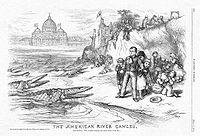
Eliot School rebellion
Encyclopedia

The incident began on a Monday morning, March 7, 1859. Massachusetts
Massachusetts
The Commonwealth of Massachusetts is a state in the New England region of the northeastern United States of America. It is bordered by Rhode Island and Connecticut to the south, New York to the west, and Vermont and New Hampshire to the north; at its east lies the Atlantic Ocean. As of the 2010...
law required that the Ten Commandments
Ten Commandments
The Ten Commandments, also known as the Decalogue , are a set of biblical principles relating to ethics and worship, which play a fundamental role in Judaism and most forms of Christianity. They include instructions to worship only God and to keep the Sabbath, and prohibitions against idolatry,...
be recited in every classroom every morning. Bible passages were also required to be read aloud. On March 7, a teacher at the Eliot School in Boston
Boston
Boston is the capital of and largest city in Massachusetts, and is one of the oldest cities in the United States. The largest city in New England, Boston is regarded as the unofficial "Capital of New England" for its economic and cultural impact on the entire New England region. The city proper had...
, Miss Sophia Shepard, called on ten-year-old Thomas Whall to recite the Ten Commandments. Whall refused because he was Catholic and Shepard insisted that the Commandments be recited as written in the Protestant King James Bible.
The following Sunday at St. Mary's Parish Sunday School, Whall was among the several hundred boys who heard Father Bernardine Wiget, a Swiss-born Jesuit and an enthusiastic ultramontane, urge them not to recite Protestant prayers lest they fall into "infidelity and heresy." On Monday, March 14 Shepard again called upon Whall and he again refused. The assistant principal was called. Saying "Here's a boy that refuses to repeat the Ten Commandments, and I will whip him till he yields if that takes the whole forenoon," he beat Whall's hand with a rattan
Rattan
Rattan is the name for the roughly 600 species of palms in the tribe Calameae, native to tropical regions of Africa, Asia and Australasia.- Structure :...
stick for 30 minutes until it was cut and bleeding. The principal then told all boys who intended to refuse to recite the King James version of the commandments to leave the school. One hundred boys left that day. Three hundred left the following day. Some boys reported to school with copies of the Vulgate
Vulgate
The Vulgate is a late 4th-century Latin translation of the Bible. It was largely the work of St. Jerome, who was commissioned by Pope Damasus I in 382 to make a revision of the old Latin translations...
Commandments that they were willing to recite, but they were refused admittance.
The incident attracted intense national interest.
According to historian John McGreevy
John McGreevy
John McGreevy is an American historian. McGreevy earned his B.A. from the University of Notre Dame and his Ph.D. from Stanford University. He has been on the Notre Dame faculty since 1997.He is the author of Catholicism and American Freedom.-Books:...
of the University of Notre Dame
University of Notre Dame
The University of Notre Dame du Lac is a Catholic research university located in Notre Dame, an unincorporated community north of the city of South Bend, in St. Joseph County, Indiana, United States...
, the incident sparked the creation of Catholic parochial schools both in Boston and nationwide. In Boston, St Mary's Parish created a primary school to educate the boys who had withdrawn from the Eliot School. First called St. Mary's Institute, and later named in honor of Father Wiget, the school enrolled 1,150 boys in the 1859-60 school year.

